Business Report: Corporate Governance and Board of Directors
VerifiedAdded on 2020/03/16
|17
|4626
|394
Report
AI Summary
This business report delves into the critical aspects of corporate governance, examining the failures of boards of directors and their impact on various corporations. It highlights the importance of accountability, ethical considerations, and stakeholder perspectives in ensuring effective governance. The report explores the issue in context, reviews relevant literature, and analyzes the problem from ethical, stakeholder, and sustainability perspectives. It provides a detailed analysis of the failures of companies such as Enron, DuPont, and WorldCom, linking these failures to the negligence of the boards of directors. The report also offers valuable recommendations to improve corporate governance, emphasizing the need for transparency, accountability, and adherence to ethical principles. Overall, the report underscores the significance of strong corporate governance in safeguarding the interests of stakeholders and promoting long-term sustainability.
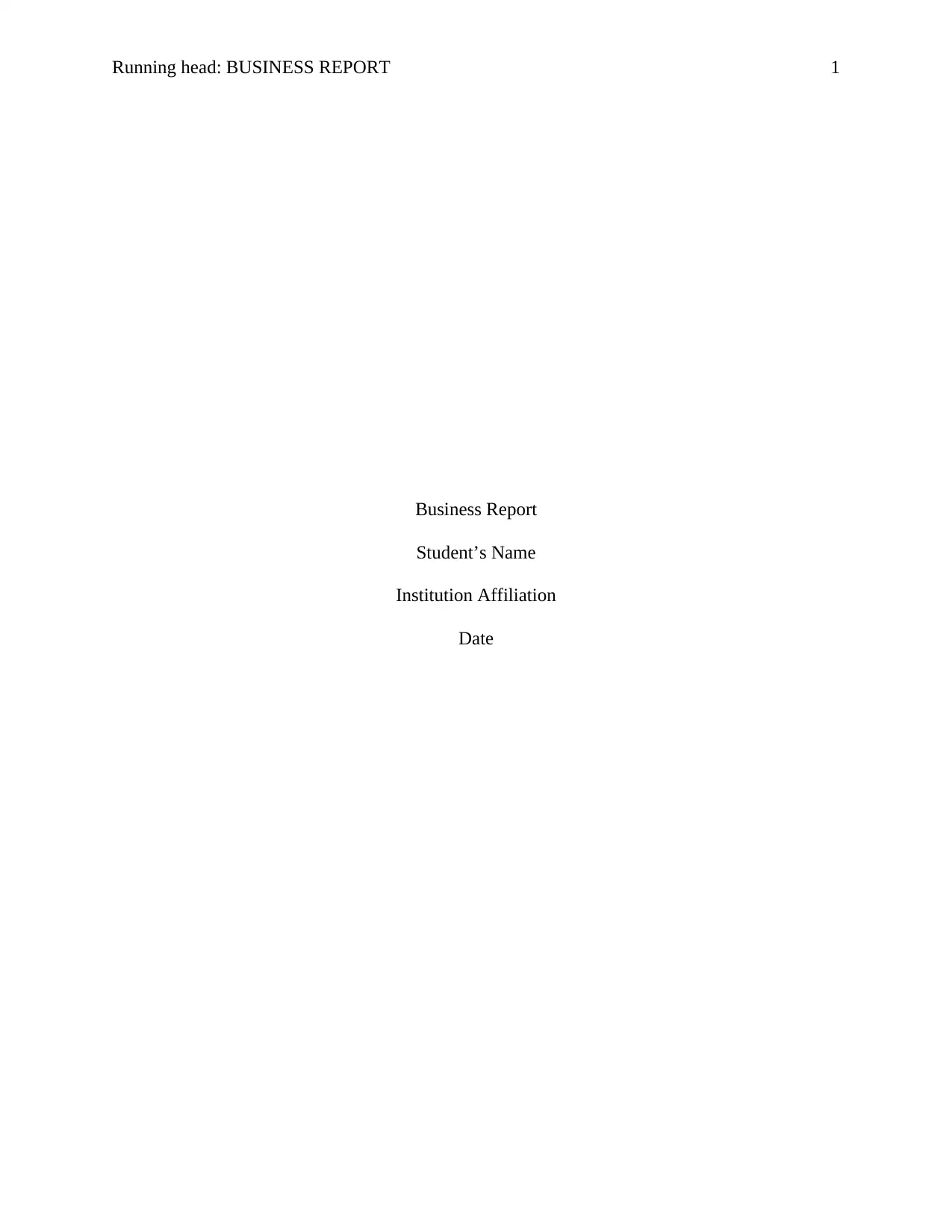
Running head: BUSINESS REPORT 1
Business Report
Student’s Name
Institution Affiliation
Date
Business Report
Student’s Name
Institution Affiliation
Date
Paraphrase This Document
Need a fresh take? Get an instant paraphrase of this document with our AI Paraphraser
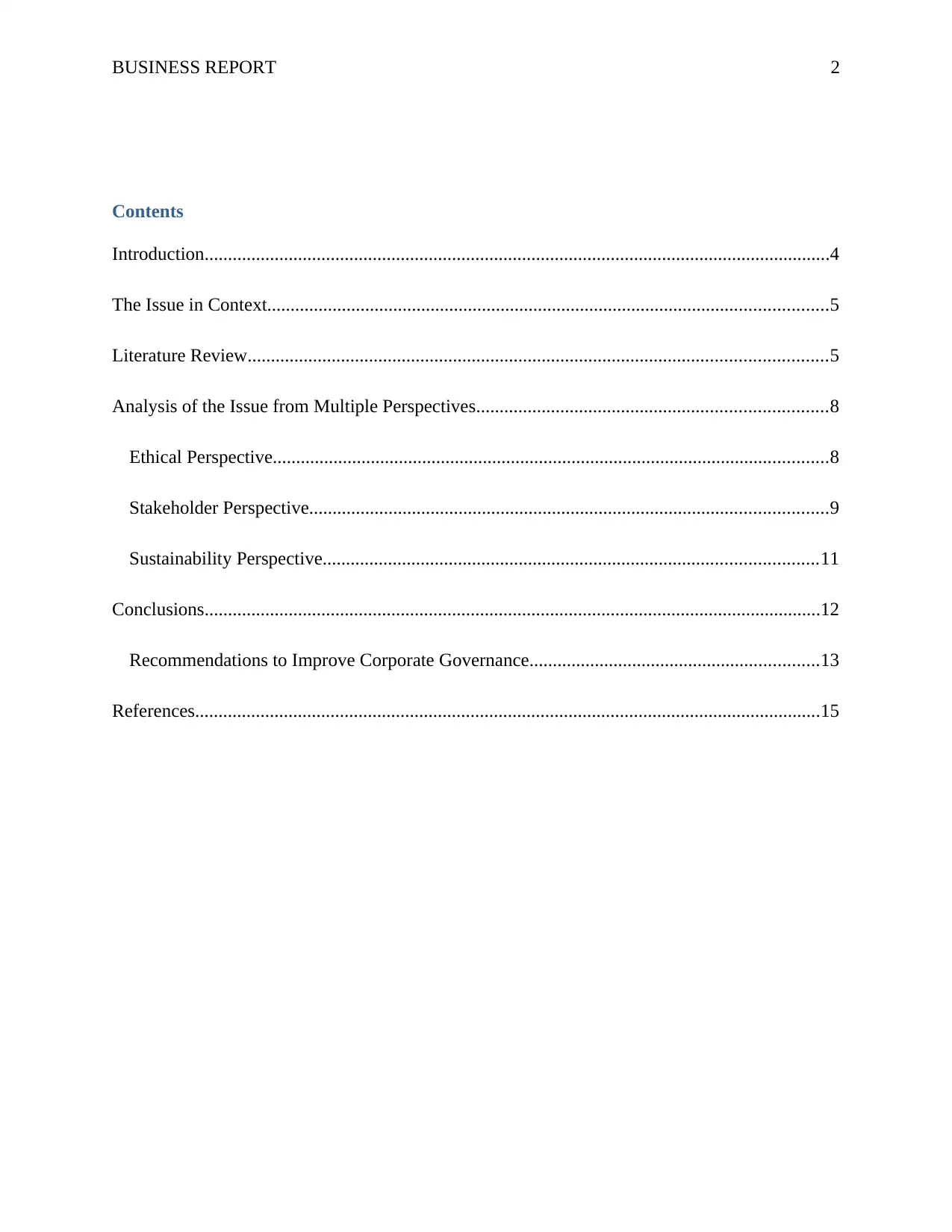
BUSINESS REPORT 2
Contents
Introduction......................................................................................................................................4
The Issue in Context........................................................................................................................5
Literature Review............................................................................................................................5
Analysis of the Issue from Multiple Perspectives...........................................................................8
Ethical Perspective.......................................................................................................................8
Stakeholder Perspective...............................................................................................................9
Sustainability Perspective..........................................................................................................11
Conclusions....................................................................................................................................12
Recommendations to Improve Corporate Governance..............................................................13
References......................................................................................................................................15
Contents
Introduction......................................................................................................................................4
The Issue in Context........................................................................................................................5
Literature Review............................................................................................................................5
Analysis of the Issue from Multiple Perspectives...........................................................................8
Ethical Perspective.......................................................................................................................8
Stakeholder Perspective...............................................................................................................9
Sustainability Perspective..........................................................................................................11
Conclusions....................................................................................................................................12
Recommendations to Improve Corporate Governance..............................................................13
References......................................................................................................................................15
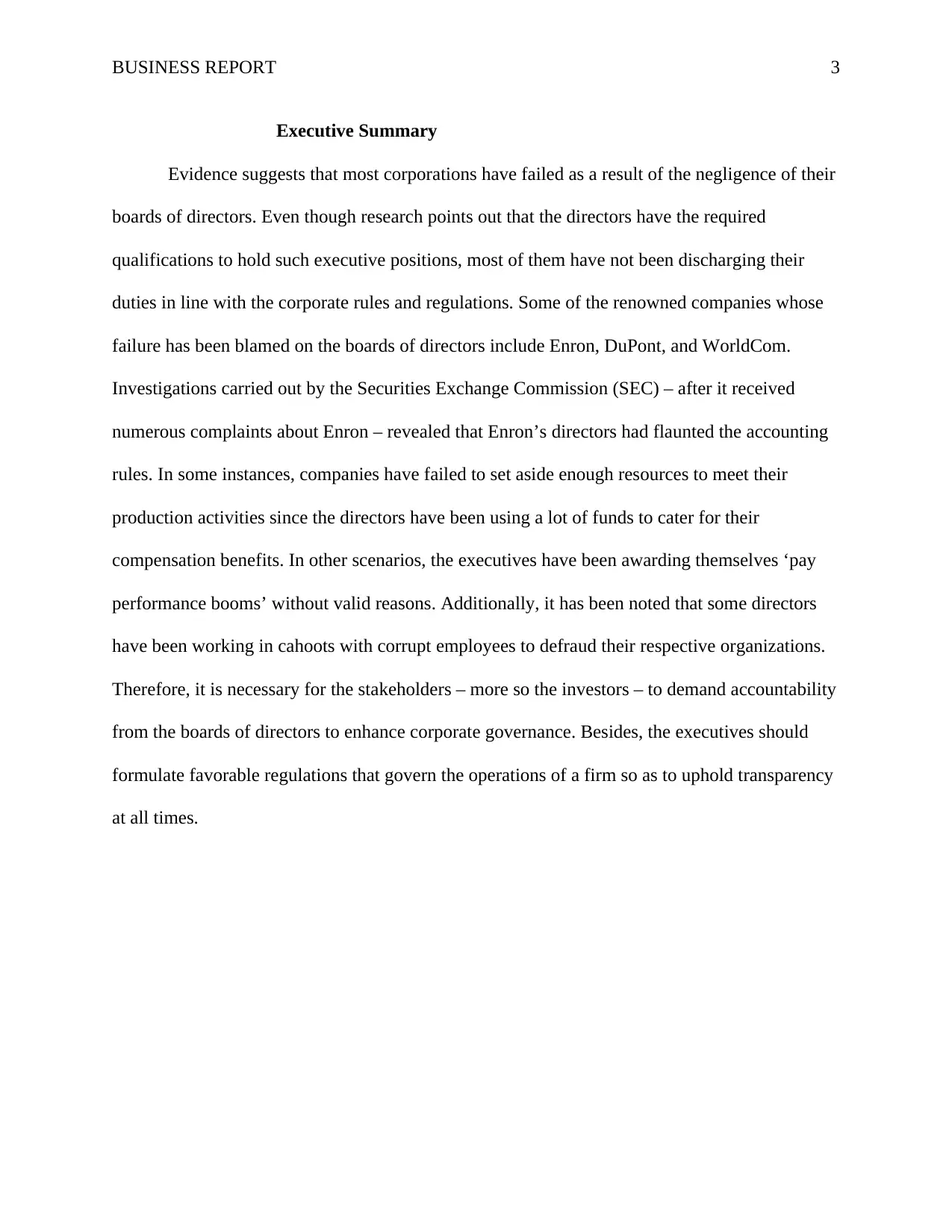
BUSINESS REPORT 3
Executive Summary
Evidence suggests that most corporations have failed as a result of the negligence of their
boards of directors. Even though research points out that the directors have the required
qualifications to hold such executive positions, most of them have not been discharging their
duties in line with the corporate rules and regulations. Some of the renowned companies whose
failure has been blamed on the boards of directors include Enron, DuPont, and WorldCom.
Investigations carried out by the Securities Exchange Commission (SEC) – after it received
numerous complaints about Enron – revealed that Enron’s directors had flaunted the accounting
rules. In some instances, companies have failed to set aside enough resources to meet their
production activities since the directors have been using a lot of funds to cater for their
compensation benefits. In other scenarios, the executives have been awarding themselves ‘pay
performance booms’ without valid reasons. Additionally, it has been noted that some directors
have been working in cahoots with corrupt employees to defraud their respective organizations.
Therefore, it is necessary for the stakeholders – more so the investors – to demand accountability
from the boards of directors to enhance corporate governance. Besides, the executives should
formulate favorable regulations that govern the operations of a firm so as to uphold transparency
at all times.
Executive Summary
Evidence suggests that most corporations have failed as a result of the negligence of their
boards of directors. Even though research points out that the directors have the required
qualifications to hold such executive positions, most of them have not been discharging their
duties in line with the corporate rules and regulations. Some of the renowned companies whose
failure has been blamed on the boards of directors include Enron, DuPont, and WorldCom.
Investigations carried out by the Securities Exchange Commission (SEC) – after it received
numerous complaints about Enron – revealed that Enron’s directors had flaunted the accounting
rules. In some instances, companies have failed to set aside enough resources to meet their
production activities since the directors have been using a lot of funds to cater for their
compensation benefits. In other scenarios, the executives have been awarding themselves ‘pay
performance booms’ without valid reasons. Additionally, it has been noted that some directors
have been working in cahoots with corrupt employees to defraud their respective organizations.
Therefore, it is necessary for the stakeholders – more so the investors – to demand accountability
from the boards of directors to enhance corporate governance. Besides, the executives should
formulate favorable regulations that govern the operations of a firm so as to uphold transparency
at all times.
⊘ This is a preview!⊘
Do you want full access?
Subscribe today to unlock all pages.

Trusted by 1+ million students worldwide
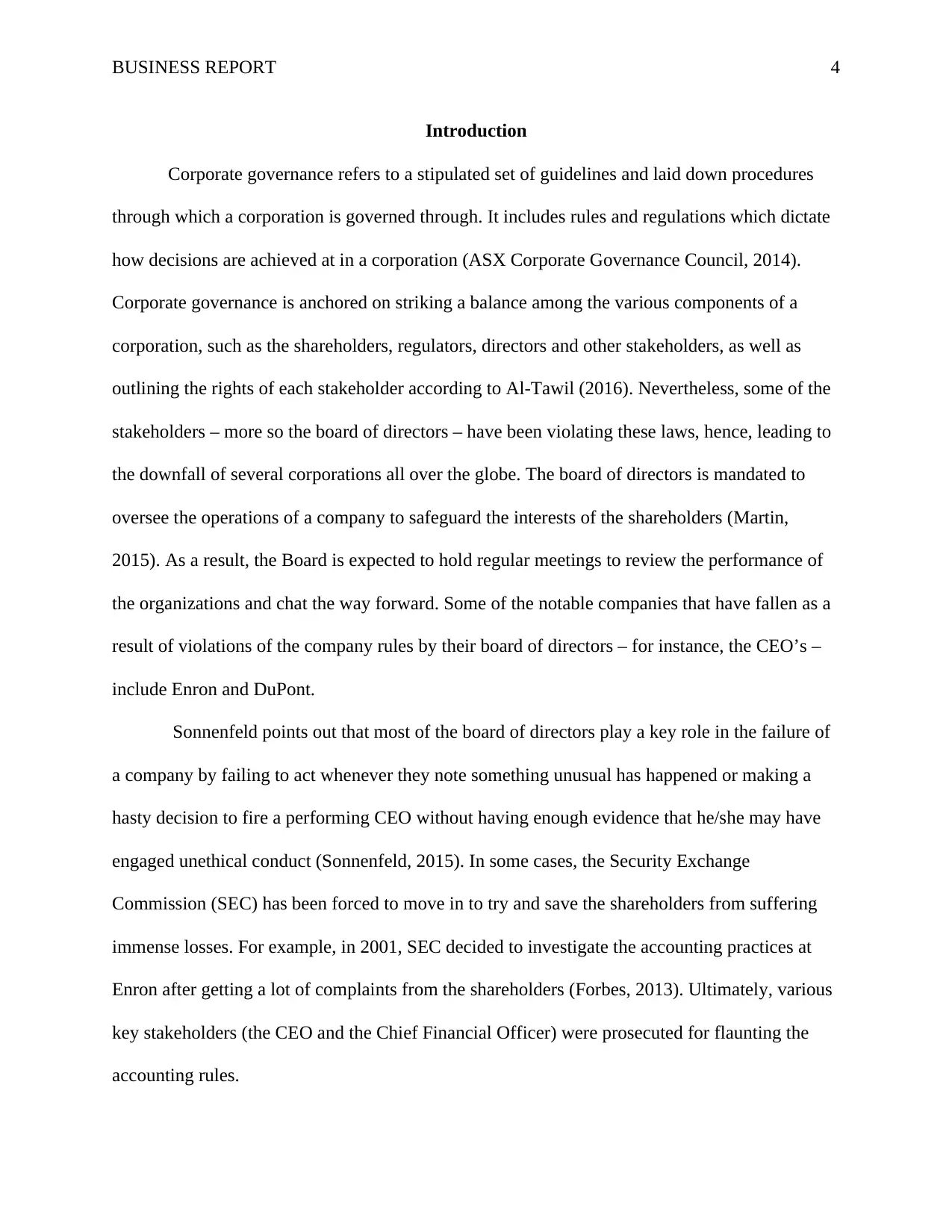
BUSINESS REPORT 4
Introduction
Corporate governance refers to a stipulated set of guidelines and laid down procedures
through which a corporation is governed through. It includes rules and regulations which dictate
how decisions are achieved at in a corporation (ASX Corporate Governance Council, 2014).
Corporate governance is anchored on striking a balance among the various components of a
corporation, such as the shareholders, regulators, directors and other stakeholders, as well as
outlining the rights of each stakeholder according to Al-Tawil (2016). Nevertheless, some of the
stakeholders – more so the board of directors – have been violating these laws, hence, leading to
the downfall of several corporations all over the globe. The board of directors is mandated to
oversee the operations of a company to safeguard the interests of the shareholders (Martin,
2015). As a result, the Board is expected to hold regular meetings to review the performance of
the organizations and chat the way forward. Some of the notable companies that have fallen as a
result of violations of the company rules by their board of directors – for instance, the CEO’s –
include Enron and DuPont.
Sonnenfeld points out that most of the board of directors play a key role in the failure of
a company by failing to act whenever they note something unusual has happened or making a
hasty decision to fire a performing CEO without having enough evidence that he/she may have
engaged unethical conduct (Sonnenfeld, 2015). In some cases, the Security Exchange
Commission (SEC) has been forced to move in to try and save the shareholders from suffering
immense losses. For example, in 2001, SEC decided to investigate the accounting practices at
Enron after getting a lot of complaints from the shareholders (Forbes, 2013). Ultimately, various
key stakeholders (the CEO and the Chief Financial Officer) were prosecuted for flaunting the
accounting rules.
Introduction
Corporate governance refers to a stipulated set of guidelines and laid down procedures
through which a corporation is governed through. It includes rules and regulations which dictate
how decisions are achieved at in a corporation (ASX Corporate Governance Council, 2014).
Corporate governance is anchored on striking a balance among the various components of a
corporation, such as the shareholders, regulators, directors and other stakeholders, as well as
outlining the rights of each stakeholder according to Al-Tawil (2016). Nevertheless, some of the
stakeholders – more so the board of directors – have been violating these laws, hence, leading to
the downfall of several corporations all over the globe. The board of directors is mandated to
oversee the operations of a company to safeguard the interests of the shareholders (Martin,
2015). As a result, the Board is expected to hold regular meetings to review the performance of
the organizations and chat the way forward. Some of the notable companies that have fallen as a
result of violations of the company rules by their board of directors – for instance, the CEO’s –
include Enron and DuPont.
Sonnenfeld points out that most of the board of directors play a key role in the failure of
a company by failing to act whenever they note something unusual has happened or making a
hasty decision to fire a performing CEO without having enough evidence that he/she may have
engaged unethical conduct (Sonnenfeld, 2015). In some cases, the Security Exchange
Commission (SEC) has been forced to move in to try and save the shareholders from suffering
immense losses. For example, in 2001, SEC decided to investigate the accounting practices at
Enron after getting a lot of complaints from the shareholders (Forbes, 2013). Ultimately, various
key stakeholders (the CEO and the Chief Financial Officer) were prosecuted for flaunting the
accounting rules.
Paraphrase This Document
Need a fresh take? Get an instant paraphrase of this document with our AI Paraphraser
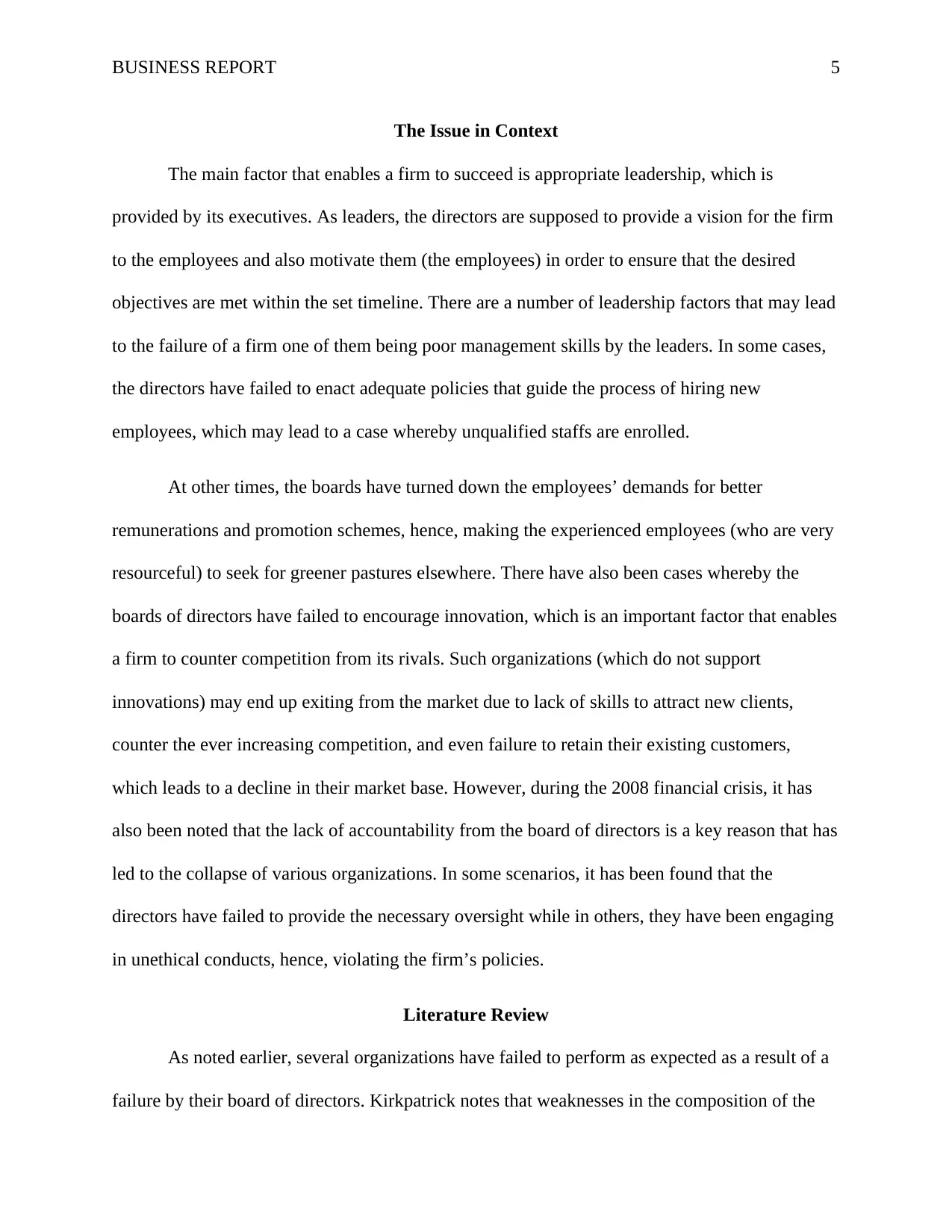
BUSINESS REPORT 5
The Issue in Context
The main factor that enables a firm to succeed is appropriate leadership, which is
provided by its executives. As leaders, the directors are supposed to provide a vision for the firm
to the employees and also motivate them (the employees) in order to ensure that the desired
objectives are met within the set timeline. There are a number of leadership factors that may lead
to the failure of a firm one of them being poor management skills by the leaders. In some cases,
the directors have failed to enact adequate policies that guide the process of hiring new
employees, which may lead to a case whereby unqualified staffs are enrolled.
At other times, the boards have turned down the employees’ demands for better
remunerations and promotion schemes, hence, making the experienced employees (who are very
resourceful) to seek for greener pastures elsewhere. There have also been cases whereby the
boards of directors have failed to encourage innovation, which is an important factor that enables
a firm to counter competition from its rivals. Such organizations (which do not support
innovations) may end up exiting from the market due to lack of skills to attract new clients,
counter the ever increasing competition, and even failure to retain their existing customers,
which leads to a decline in their market base. However, during the 2008 financial crisis, it has
also been noted that the lack of accountability from the board of directors is a key reason that has
led to the collapse of various organizations. In some scenarios, it has been found that the
directors have failed to provide the necessary oversight while in others, they have been engaging
in unethical conducts, hence, violating the firm’s policies.
Literature Review
As noted earlier, several organizations have failed to perform as expected as a result of a
failure by their board of directors. Kirkpatrick notes that weaknesses in the composition of the
The Issue in Context
The main factor that enables a firm to succeed is appropriate leadership, which is
provided by its executives. As leaders, the directors are supposed to provide a vision for the firm
to the employees and also motivate them (the employees) in order to ensure that the desired
objectives are met within the set timeline. There are a number of leadership factors that may lead
to the failure of a firm one of them being poor management skills by the leaders. In some cases,
the directors have failed to enact adequate policies that guide the process of hiring new
employees, which may lead to a case whereby unqualified staffs are enrolled.
At other times, the boards have turned down the employees’ demands for better
remunerations and promotion schemes, hence, making the experienced employees (who are very
resourceful) to seek for greener pastures elsewhere. There have also been cases whereby the
boards of directors have failed to encourage innovation, which is an important factor that enables
a firm to counter competition from its rivals. Such organizations (which do not support
innovations) may end up exiting from the market due to lack of skills to attract new clients,
counter the ever increasing competition, and even failure to retain their existing customers,
which leads to a decline in their market base. However, during the 2008 financial crisis, it has
also been noted that the lack of accountability from the board of directors is a key reason that has
led to the collapse of various organizations. In some scenarios, it has been found that the
directors have failed to provide the necessary oversight while in others, they have been engaging
in unethical conducts, hence, violating the firm’s policies.
Literature Review
As noted earlier, several organizations have failed to perform as expected as a result of a
failure by their board of directors. Kirkpatrick notes that weaknesses in the composition of the
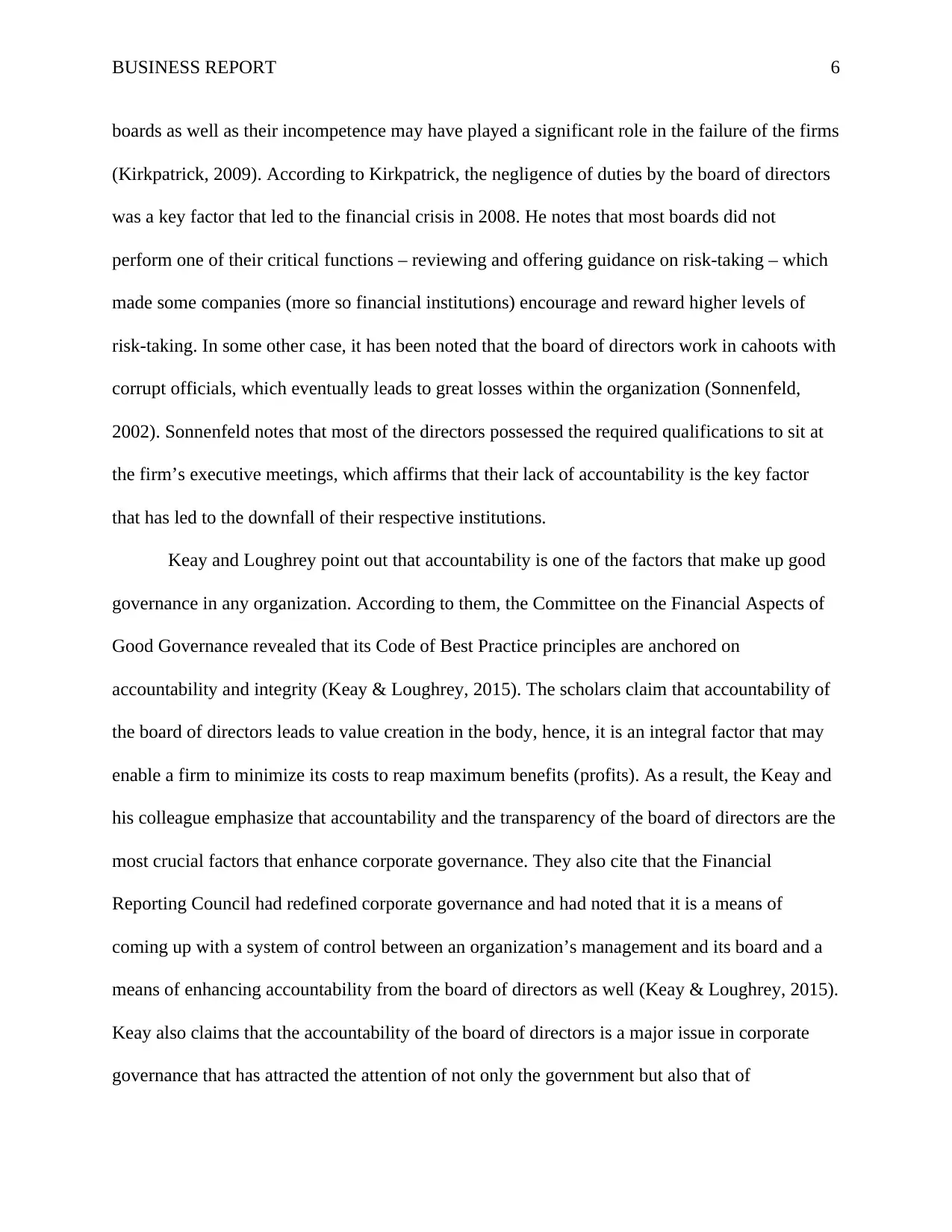
BUSINESS REPORT 6
boards as well as their incompetence may have played a significant role in the failure of the firms
(Kirkpatrick, 2009). According to Kirkpatrick, the negligence of duties by the board of directors
was a key factor that led to the financial crisis in 2008. He notes that most boards did not
perform one of their critical functions – reviewing and offering guidance on risk-taking – which
made some companies (more so financial institutions) encourage and reward higher levels of
risk-taking. In some other case, it has been noted that the board of directors work in cahoots with
corrupt officials, which eventually leads to great losses within the organization (Sonnenfeld,
2002). Sonnenfeld notes that most of the directors possessed the required qualifications to sit at
the firm’s executive meetings, which affirms that their lack of accountability is the key factor
that has led to the downfall of their respective institutions.
Keay and Loughrey point out that accountability is one of the factors that make up good
governance in any organization. According to them, the Committee on the Financial Aspects of
Good Governance revealed that its Code of Best Practice principles are anchored on
accountability and integrity (Keay & Loughrey, 2015). The scholars claim that accountability of
the board of directors leads to value creation in the body, hence, it is an integral factor that may
enable a firm to minimize its costs to reap maximum benefits (profits). As a result, the Keay and
his colleague emphasize that accountability and the transparency of the board of directors are the
most crucial factors that enhance corporate governance. They also cite that the Financial
Reporting Council had redefined corporate governance and had noted that it is a means of
coming up with a system of control between an organization’s management and its board and a
means of enhancing accountability from the board of directors as well (Keay & Loughrey, 2015).
Keay also claims that the accountability of the board of directors is a major issue in corporate
governance that has attracted the attention of not only the government but also that of
boards as well as their incompetence may have played a significant role in the failure of the firms
(Kirkpatrick, 2009). According to Kirkpatrick, the negligence of duties by the board of directors
was a key factor that led to the financial crisis in 2008. He notes that most boards did not
perform one of their critical functions – reviewing and offering guidance on risk-taking – which
made some companies (more so financial institutions) encourage and reward higher levels of
risk-taking. In some other case, it has been noted that the board of directors work in cahoots with
corrupt officials, which eventually leads to great losses within the organization (Sonnenfeld,
2002). Sonnenfeld notes that most of the directors possessed the required qualifications to sit at
the firm’s executive meetings, which affirms that their lack of accountability is the key factor
that has led to the downfall of their respective institutions.
Keay and Loughrey point out that accountability is one of the factors that make up good
governance in any organization. According to them, the Committee on the Financial Aspects of
Good Governance revealed that its Code of Best Practice principles are anchored on
accountability and integrity (Keay & Loughrey, 2015). The scholars claim that accountability of
the board of directors leads to value creation in the body, hence, it is an integral factor that may
enable a firm to minimize its costs to reap maximum benefits (profits). As a result, the Keay and
his colleague emphasize that accountability and the transparency of the board of directors are the
most crucial factors that enhance corporate governance. They also cite that the Financial
Reporting Council had redefined corporate governance and had noted that it is a means of
coming up with a system of control between an organization’s management and its board and a
means of enhancing accountability from the board of directors as well (Keay & Loughrey, 2015).
Keay also claims that the accountability of the board of directors is a major issue in corporate
governance that has attracted the attention of not only the government but also that of
⊘ This is a preview!⊘
Do you want full access?
Subscribe today to unlock all pages.

Trusted by 1+ million students worldwide
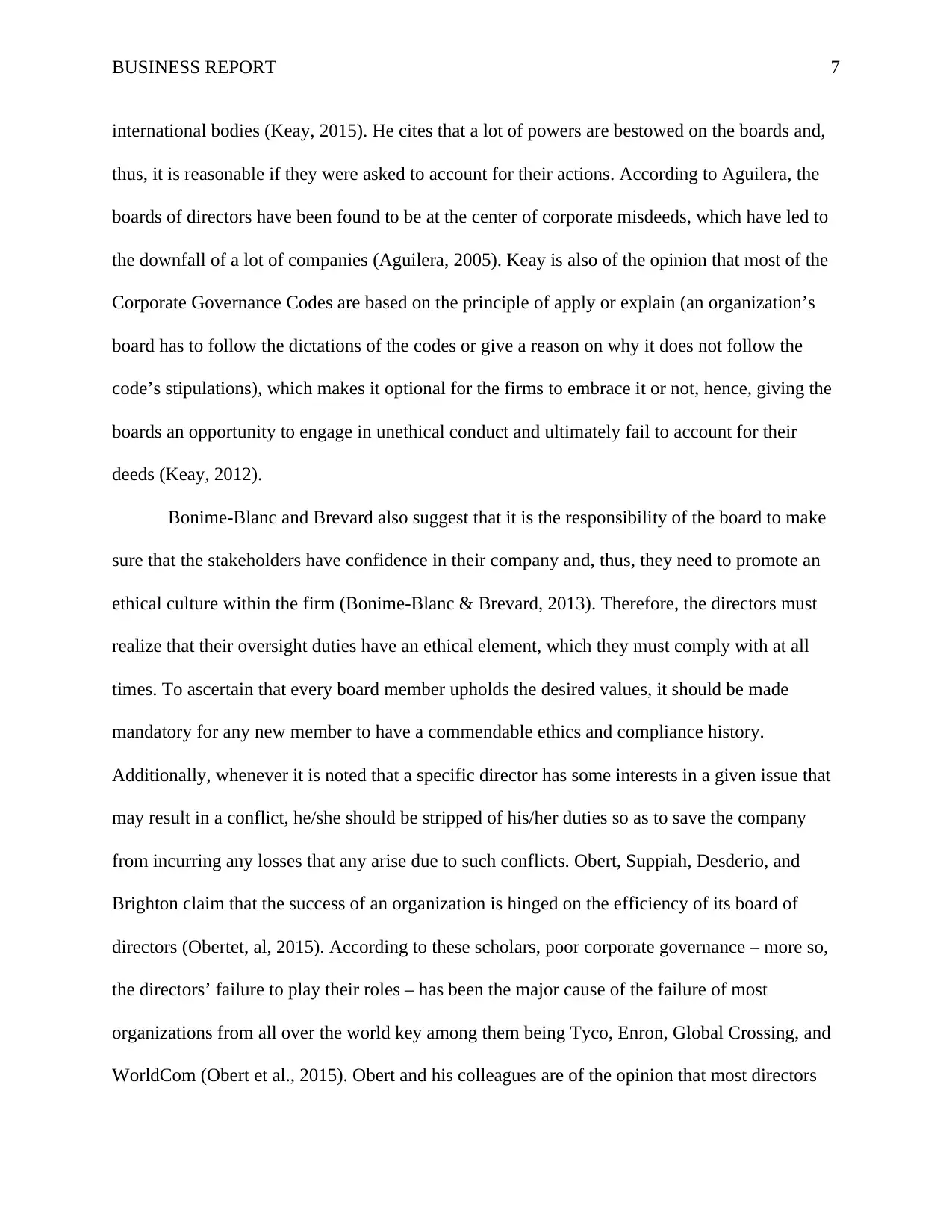
BUSINESS REPORT 7
international bodies (Keay, 2015). He cites that a lot of powers are bestowed on the boards and,
thus, it is reasonable if they were asked to account for their actions. According to Aguilera, the
boards of directors have been found to be at the center of corporate misdeeds, which have led to
the downfall of a lot of companies (Aguilera, 2005). Keay is also of the opinion that most of the
Corporate Governance Codes are based on the principle of apply or explain (an organization’s
board has to follow the dictations of the codes or give a reason on why it does not follow the
code’s stipulations), which makes it optional for the firms to embrace it or not, hence, giving the
boards an opportunity to engage in unethical conduct and ultimately fail to account for their
deeds (Keay, 2012).
Bonime-Blanc and Brevard also suggest that it is the responsibility of the board to make
sure that the stakeholders have confidence in their company and, thus, they need to promote an
ethical culture within the firm (Bonime-Blanc & Brevard, 2013). Therefore, the directors must
realize that their oversight duties have an ethical element, which they must comply with at all
times. To ascertain that every board member upholds the desired values, it should be made
mandatory for any new member to have a commendable ethics and compliance history.
Additionally, whenever it is noted that a specific director has some interests in a given issue that
may result in a conflict, he/she should be stripped of his/her duties so as to save the company
from incurring any losses that any arise due to such conflicts. Obert, Suppiah, Desderio, and
Brighton claim that the success of an organization is hinged on the efficiency of its board of
directors (Obertet, al, 2015). According to these scholars, poor corporate governance – more so,
the directors’ failure to play their roles – has been the major cause of the failure of most
organizations from all over the world key among them being Tyco, Enron, Global Crossing, and
WorldCom (Obert et al., 2015). Obert and his colleagues are of the opinion that most directors
international bodies (Keay, 2015). He cites that a lot of powers are bestowed on the boards and,
thus, it is reasonable if they were asked to account for their actions. According to Aguilera, the
boards of directors have been found to be at the center of corporate misdeeds, which have led to
the downfall of a lot of companies (Aguilera, 2005). Keay is also of the opinion that most of the
Corporate Governance Codes are based on the principle of apply or explain (an organization’s
board has to follow the dictations of the codes or give a reason on why it does not follow the
code’s stipulations), which makes it optional for the firms to embrace it or not, hence, giving the
boards an opportunity to engage in unethical conduct and ultimately fail to account for their
deeds (Keay, 2012).
Bonime-Blanc and Brevard also suggest that it is the responsibility of the board to make
sure that the stakeholders have confidence in their company and, thus, they need to promote an
ethical culture within the firm (Bonime-Blanc & Brevard, 2013). Therefore, the directors must
realize that their oversight duties have an ethical element, which they must comply with at all
times. To ascertain that every board member upholds the desired values, it should be made
mandatory for any new member to have a commendable ethics and compliance history.
Additionally, whenever it is noted that a specific director has some interests in a given issue that
may result in a conflict, he/she should be stripped of his/her duties so as to save the company
from incurring any losses that any arise due to such conflicts. Obert, Suppiah, Desderio, and
Brighton claim that the success of an organization is hinged on the efficiency of its board of
directors (Obertet, al, 2015). According to these scholars, poor corporate governance – more so,
the directors’ failure to play their roles – has been the major cause of the failure of most
organizations from all over the world key among them being Tyco, Enron, Global Crossing, and
WorldCom (Obert et al., 2015). Obert and his colleagues are of the opinion that most directors
Paraphrase This Document
Need a fresh take? Get an instant paraphrase of this document with our AI Paraphraser
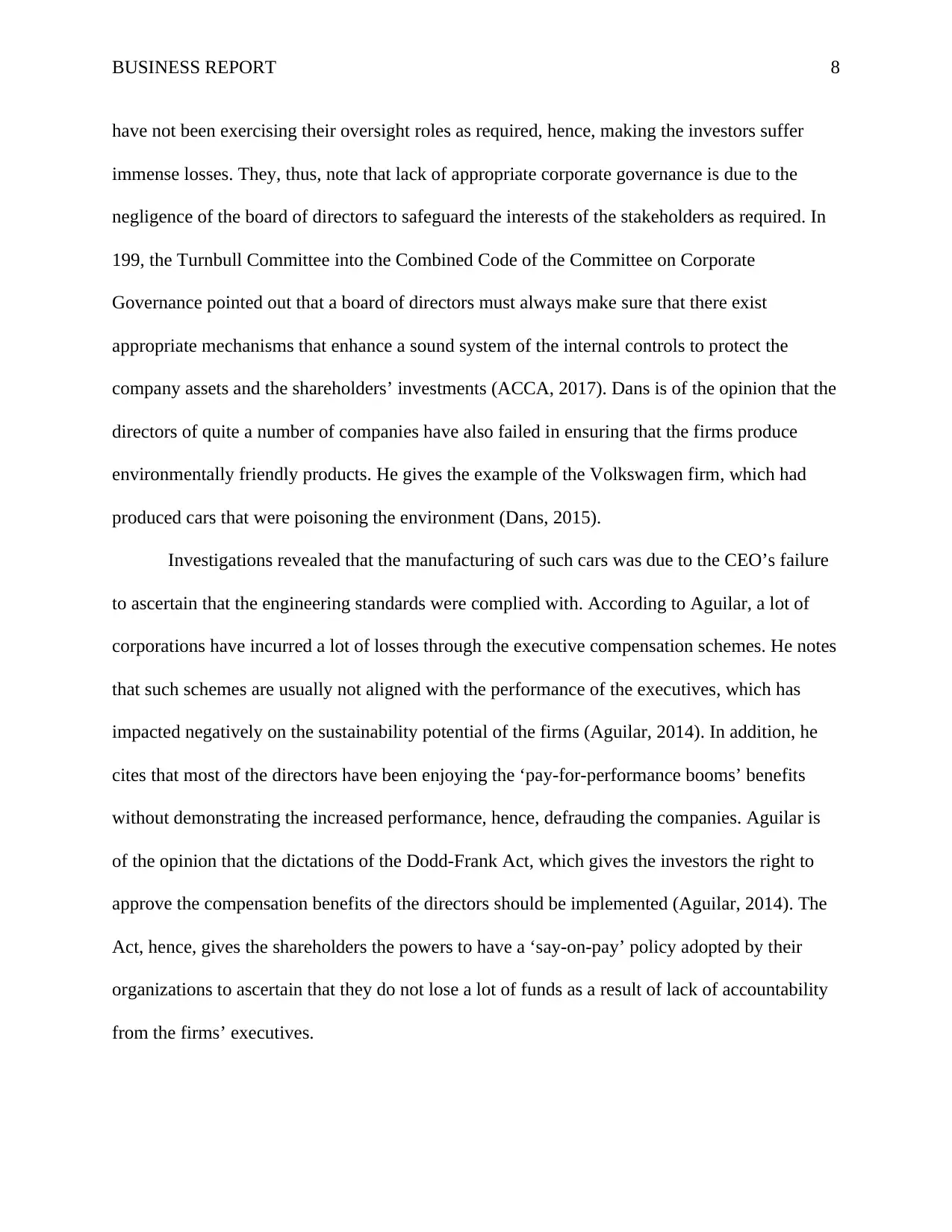
BUSINESS REPORT 8
have not been exercising their oversight roles as required, hence, making the investors suffer
immense losses. They, thus, note that lack of appropriate corporate governance is due to the
negligence of the board of directors to safeguard the interests of the stakeholders as required. In
199, the Turnbull Committee into the Combined Code of the Committee on Corporate
Governance pointed out that a board of directors must always make sure that there exist
appropriate mechanisms that enhance a sound system of the internal controls to protect the
company assets and the shareholders’ investments (ACCA, 2017). Dans is of the opinion that the
directors of quite a number of companies have also failed in ensuring that the firms produce
environmentally friendly products. He gives the example of the Volkswagen firm, which had
produced cars that were poisoning the environment (Dans, 2015).
Investigations revealed that the manufacturing of such cars was due to the CEO’s failure
to ascertain that the engineering standards were complied with. According to Aguilar, a lot of
corporations have incurred a lot of losses through the executive compensation schemes. He notes
that such schemes are usually not aligned with the performance of the executives, which has
impacted negatively on the sustainability potential of the firms (Aguilar, 2014). In addition, he
cites that most of the directors have been enjoying the ‘pay-for-performance booms’ benefits
without demonstrating the increased performance, hence, defrauding the companies. Aguilar is
of the opinion that the dictations of the Dodd-Frank Act, which gives the investors the right to
approve the compensation benefits of the directors should be implemented (Aguilar, 2014). The
Act, hence, gives the shareholders the powers to have a ‘say-on-pay’ policy adopted by their
organizations to ascertain that they do not lose a lot of funds as a result of lack of accountability
from the firms’ executives.
have not been exercising their oversight roles as required, hence, making the investors suffer
immense losses. They, thus, note that lack of appropriate corporate governance is due to the
negligence of the board of directors to safeguard the interests of the stakeholders as required. In
199, the Turnbull Committee into the Combined Code of the Committee on Corporate
Governance pointed out that a board of directors must always make sure that there exist
appropriate mechanisms that enhance a sound system of the internal controls to protect the
company assets and the shareholders’ investments (ACCA, 2017). Dans is of the opinion that the
directors of quite a number of companies have also failed in ensuring that the firms produce
environmentally friendly products. He gives the example of the Volkswagen firm, which had
produced cars that were poisoning the environment (Dans, 2015).
Investigations revealed that the manufacturing of such cars was due to the CEO’s failure
to ascertain that the engineering standards were complied with. According to Aguilar, a lot of
corporations have incurred a lot of losses through the executive compensation schemes. He notes
that such schemes are usually not aligned with the performance of the executives, which has
impacted negatively on the sustainability potential of the firms (Aguilar, 2014). In addition, he
cites that most of the directors have been enjoying the ‘pay-for-performance booms’ benefits
without demonstrating the increased performance, hence, defrauding the companies. Aguilar is
of the opinion that the dictations of the Dodd-Frank Act, which gives the investors the right to
approve the compensation benefits of the directors should be implemented (Aguilar, 2014). The
Act, hence, gives the shareholders the powers to have a ‘say-on-pay’ policy adopted by their
organizations to ascertain that they do not lose a lot of funds as a result of lack of accountability
from the firms’ executives.
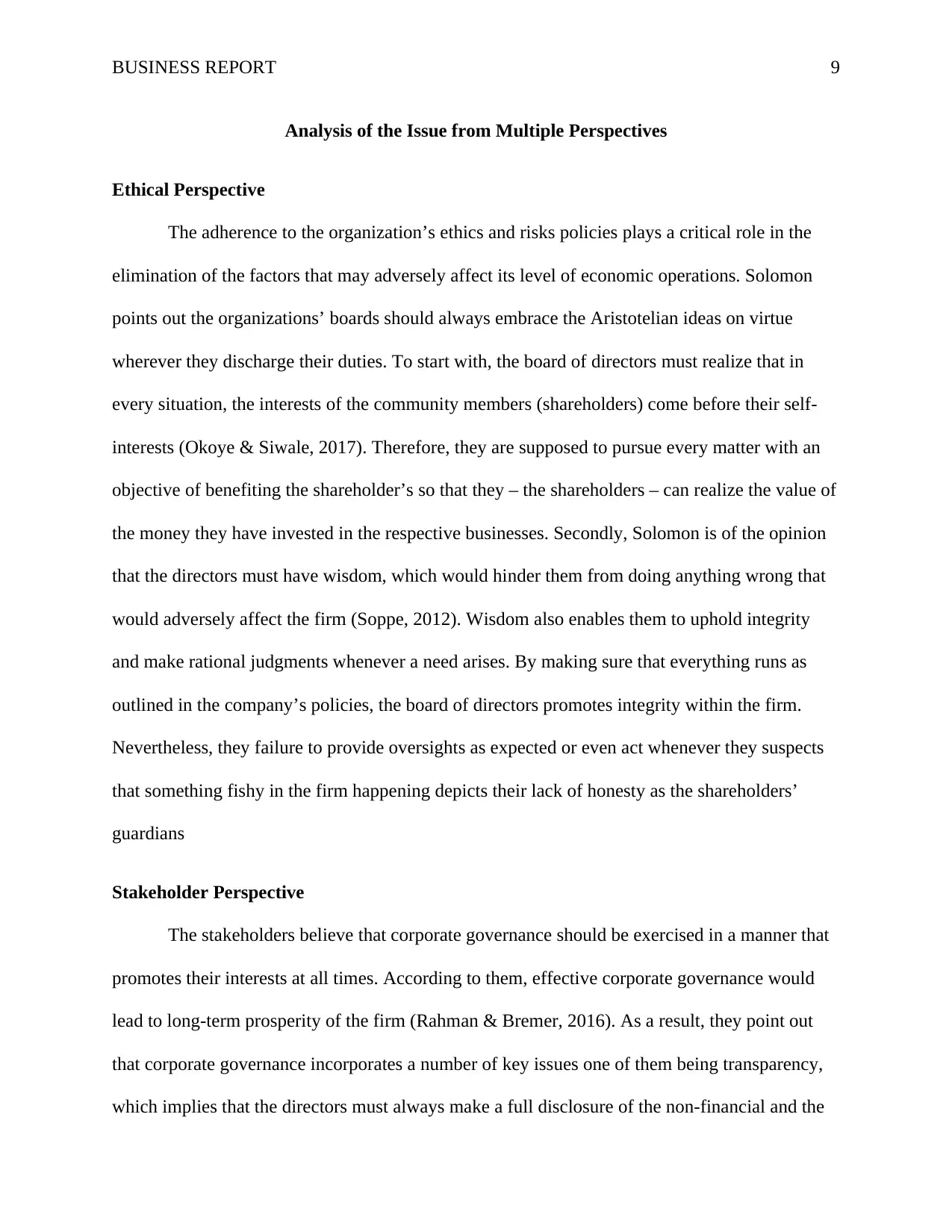
BUSINESS REPORT 9
Analysis of the Issue from Multiple Perspectives
Ethical Perspective
The adherence to the organization’s ethics and risks policies plays a critical role in the
elimination of the factors that may adversely affect its level of economic operations. Solomon
points out the organizations’ boards should always embrace the Aristotelian ideas on virtue
wherever they discharge their duties. To start with, the board of directors must realize that in
every situation, the interests of the community members (shareholders) come before their self-
interests (Okoye & Siwale, 2017). Therefore, they are supposed to pursue every matter with an
objective of benefiting the shareholder’s so that they – the shareholders – can realize the value of
the money they have invested in the respective businesses. Secondly, Solomon is of the opinion
that the directors must have wisdom, which would hinder them from doing anything wrong that
would adversely affect the firm (Soppe, 2012). Wisdom also enables them to uphold integrity
and make rational judgments whenever a need arises. By making sure that everything runs as
outlined in the company’s policies, the board of directors promotes integrity within the firm.
Nevertheless, they failure to provide oversights as expected or even act whenever they suspects
that something fishy in the firm happening depicts their lack of honesty as the shareholders’
guardians
Stakeholder Perspective
The stakeholders believe that corporate governance should be exercised in a manner that
promotes their interests at all times. According to them, effective corporate governance would
lead to long-term prosperity of the firm (Rahman & Bremer, 2016). As a result, they point out
that corporate governance incorporates a number of key issues one of them being transparency,
which implies that the directors must always make a full disclosure of the non-financial and the
Analysis of the Issue from Multiple Perspectives
Ethical Perspective
The adherence to the organization’s ethics and risks policies plays a critical role in the
elimination of the factors that may adversely affect its level of economic operations. Solomon
points out the organizations’ boards should always embrace the Aristotelian ideas on virtue
wherever they discharge their duties. To start with, the board of directors must realize that in
every situation, the interests of the community members (shareholders) come before their self-
interests (Okoye & Siwale, 2017). Therefore, they are supposed to pursue every matter with an
objective of benefiting the shareholder’s so that they – the shareholders – can realize the value of
the money they have invested in the respective businesses. Secondly, Solomon is of the opinion
that the directors must have wisdom, which would hinder them from doing anything wrong that
would adversely affect the firm (Soppe, 2012). Wisdom also enables them to uphold integrity
and make rational judgments whenever a need arises. By making sure that everything runs as
outlined in the company’s policies, the board of directors promotes integrity within the firm.
Nevertheless, they failure to provide oversights as expected or even act whenever they suspects
that something fishy in the firm happening depicts their lack of honesty as the shareholders’
guardians
Stakeholder Perspective
The stakeholders believe that corporate governance should be exercised in a manner that
promotes their interests at all times. According to them, effective corporate governance would
lead to long-term prosperity of the firm (Rahman & Bremer, 2016). As a result, they point out
that corporate governance incorporates a number of key issues one of them being transparency,
which implies that the directors must always make a full disclosure of the non-financial and the
⊘ This is a preview!⊘
Do you want full access?
Subscribe today to unlock all pages.

Trusted by 1+ million students worldwide
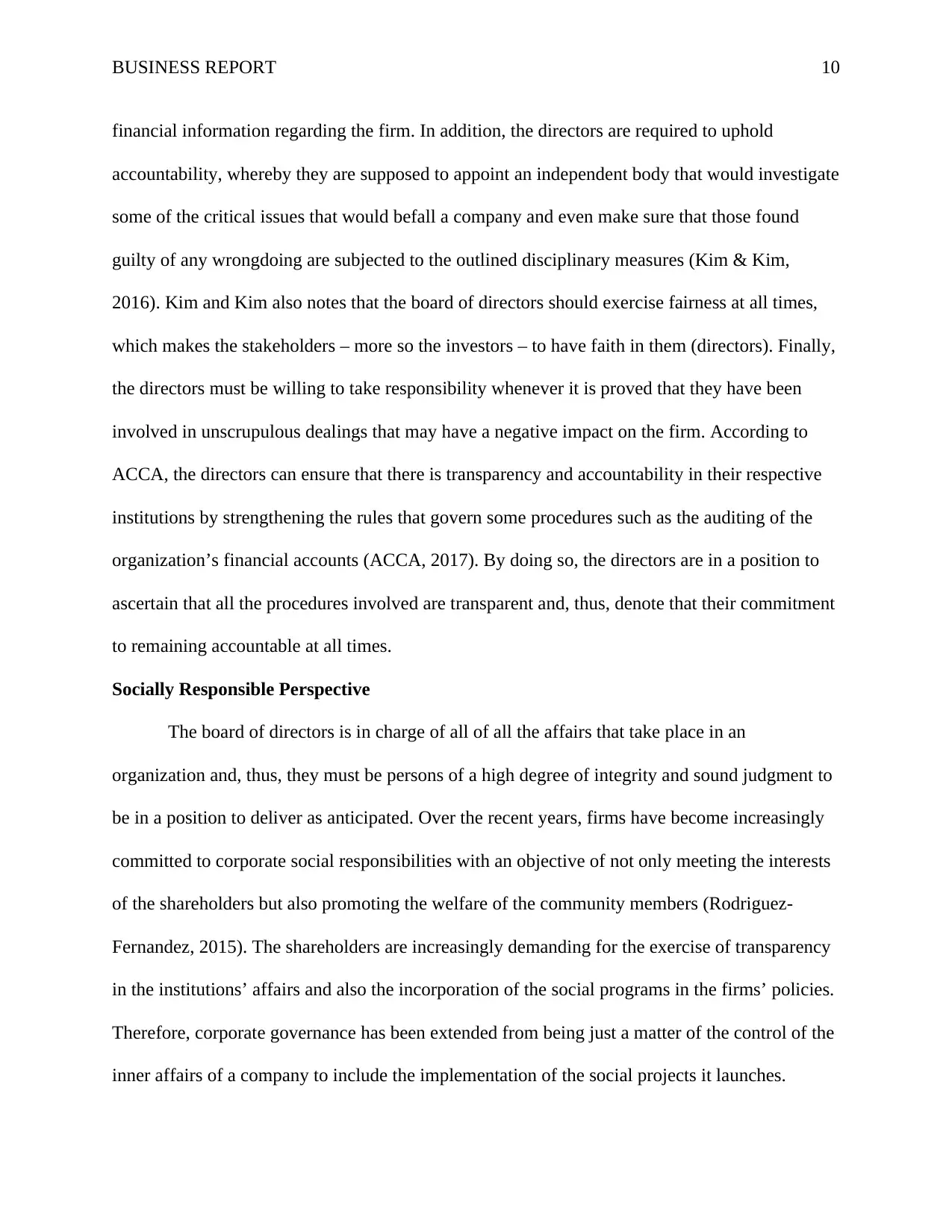
BUSINESS REPORT 10
financial information regarding the firm. In addition, the directors are required to uphold
accountability, whereby they are supposed to appoint an independent body that would investigate
some of the critical issues that would befall a company and even make sure that those found
guilty of any wrongdoing are subjected to the outlined disciplinary measures (Kim & Kim,
2016). Kim and Kim also notes that the board of directors should exercise fairness at all times,
which makes the stakeholders – more so the investors – to have faith in them (directors). Finally,
the directors must be willing to take responsibility whenever it is proved that they have been
involved in unscrupulous dealings that may have a negative impact on the firm. According to
ACCA, the directors can ensure that there is transparency and accountability in their respective
institutions by strengthening the rules that govern some procedures such as the auditing of the
organization’s financial accounts (ACCA, 2017). By doing so, the directors are in a position to
ascertain that all the procedures involved are transparent and, thus, denote that their commitment
to remaining accountable at all times.
Socially Responsible Perspective
The board of directors is in charge of all of all the affairs that take place in an
organization and, thus, they must be persons of a high degree of integrity and sound judgment to
be in a position to deliver as anticipated. Over the recent years, firms have become increasingly
committed to corporate social responsibilities with an objective of not only meeting the interests
of the shareholders but also promoting the welfare of the community members (Rodriguez-
Fernandez, 2015). The shareholders are increasingly demanding for the exercise of transparency
in the institutions’ affairs and also the incorporation of the social programs in the firms’ policies.
Therefore, corporate governance has been extended from being just a matter of the control of the
inner affairs of a company to include the implementation of the social projects it launches.
financial information regarding the firm. In addition, the directors are required to uphold
accountability, whereby they are supposed to appoint an independent body that would investigate
some of the critical issues that would befall a company and even make sure that those found
guilty of any wrongdoing are subjected to the outlined disciplinary measures (Kim & Kim,
2016). Kim and Kim also notes that the board of directors should exercise fairness at all times,
which makes the stakeholders – more so the investors – to have faith in them (directors). Finally,
the directors must be willing to take responsibility whenever it is proved that they have been
involved in unscrupulous dealings that may have a negative impact on the firm. According to
ACCA, the directors can ensure that there is transparency and accountability in their respective
institutions by strengthening the rules that govern some procedures such as the auditing of the
organization’s financial accounts (ACCA, 2017). By doing so, the directors are in a position to
ascertain that all the procedures involved are transparent and, thus, denote that their commitment
to remaining accountable at all times.
Socially Responsible Perspective
The board of directors is in charge of all of all the affairs that take place in an
organization and, thus, they must be persons of a high degree of integrity and sound judgment to
be in a position to deliver as anticipated. Over the recent years, firms have become increasingly
committed to corporate social responsibilities with an objective of not only meeting the interests
of the shareholders but also promoting the welfare of the community members (Rodriguez-
Fernandez, 2015). The shareholders are increasingly demanding for the exercise of transparency
in the institutions’ affairs and also the incorporation of the social programs in the firms’ policies.
Therefore, corporate governance has been extended from being just a matter of the control of the
inner affairs of a company to include the implementation of the social projects it launches.
Paraphrase This Document
Need a fresh take? Get an instant paraphrase of this document with our AI Paraphraser
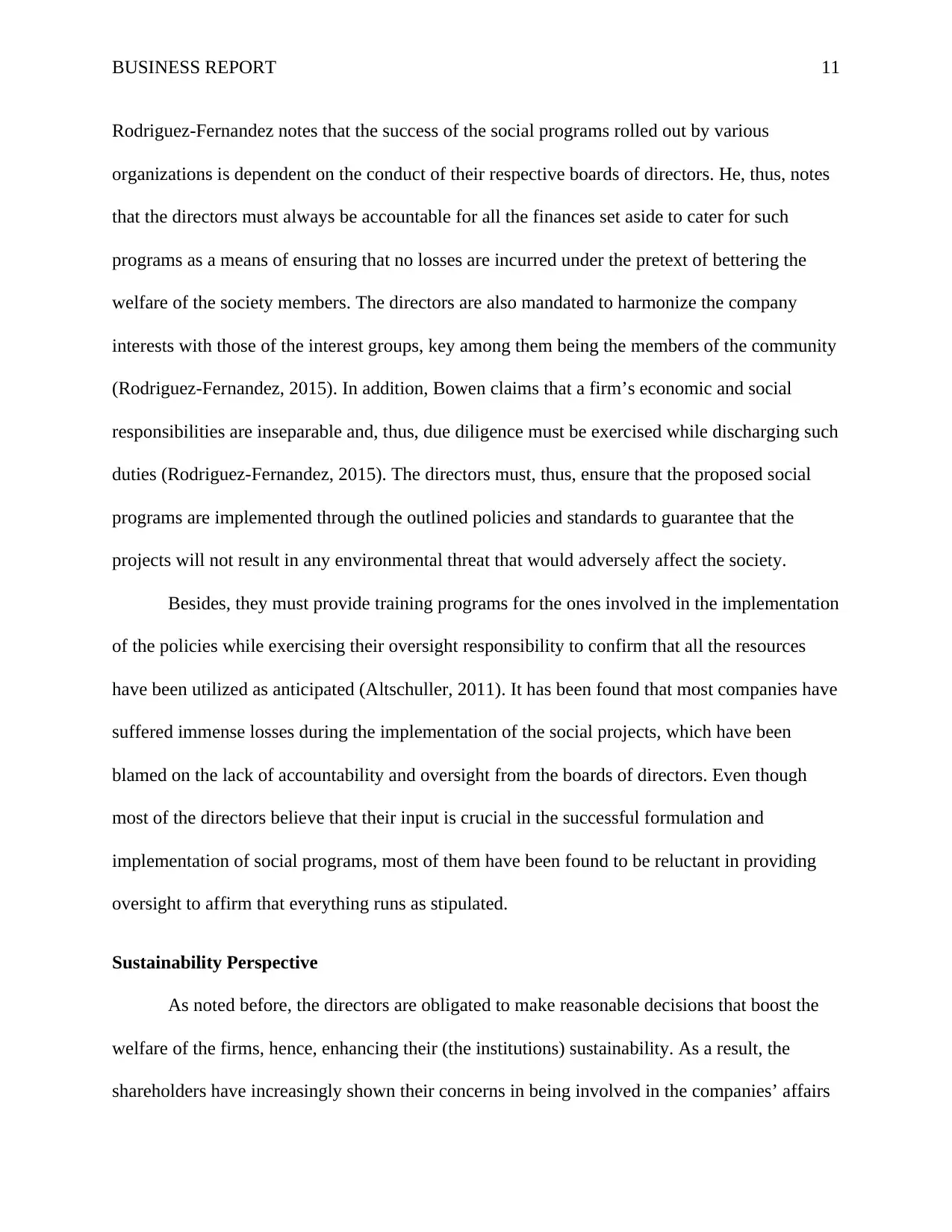
BUSINESS REPORT 11
Rodriguez-Fernandez notes that the success of the social programs rolled out by various
organizations is dependent on the conduct of their respective boards of directors. He, thus, notes
that the directors must always be accountable for all the finances set aside to cater for such
programs as a means of ensuring that no losses are incurred under the pretext of bettering the
welfare of the society members. The directors are also mandated to harmonize the company
interests with those of the interest groups, key among them being the members of the community
(Rodriguez-Fernandez, 2015). In addition, Bowen claims that a firm’s economic and social
responsibilities are inseparable and, thus, due diligence must be exercised while discharging such
duties (Rodriguez-Fernandez, 2015). The directors must, thus, ensure that the proposed social
programs are implemented through the outlined policies and standards to guarantee that the
projects will not result in any environmental threat that would adversely affect the society.
Besides, they must provide training programs for the ones involved in the implementation
of the policies while exercising their oversight responsibility to confirm that all the resources
have been utilized as anticipated (Altschuller, 2011). It has been found that most companies have
suffered immense losses during the implementation of the social projects, which have been
blamed on the lack of accountability and oversight from the boards of directors. Even though
most of the directors believe that their input is crucial in the successful formulation and
implementation of social programs, most of them have been found to be reluctant in providing
oversight to affirm that everything runs as stipulated.
Sustainability Perspective
As noted before, the directors are obligated to make reasonable decisions that boost the
welfare of the firms, hence, enhancing their (the institutions) sustainability. As a result, the
shareholders have increasingly shown their concerns in being involved in the companies’ affairs
Rodriguez-Fernandez notes that the success of the social programs rolled out by various
organizations is dependent on the conduct of their respective boards of directors. He, thus, notes
that the directors must always be accountable for all the finances set aside to cater for such
programs as a means of ensuring that no losses are incurred under the pretext of bettering the
welfare of the society members. The directors are also mandated to harmonize the company
interests with those of the interest groups, key among them being the members of the community
(Rodriguez-Fernandez, 2015). In addition, Bowen claims that a firm’s economic and social
responsibilities are inseparable and, thus, due diligence must be exercised while discharging such
duties (Rodriguez-Fernandez, 2015). The directors must, thus, ensure that the proposed social
programs are implemented through the outlined policies and standards to guarantee that the
projects will not result in any environmental threat that would adversely affect the society.
Besides, they must provide training programs for the ones involved in the implementation
of the policies while exercising their oversight responsibility to confirm that all the resources
have been utilized as anticipated (Altschuller, 2011). It has been found that most companies have
suffered immense losses during the implementation of the social projects, which have been
blamed on the lack of accountability and oversight from the boards of directors. Even though
most of the directors believe that their input is crucial in the successful formulation and
implementation of social programs, most of them have been found to be reluctant in providing
oversight to affirm that everything runs as stipulated.
Sustainability Perspective
As noted before, the directors are obligated to make reasonable decisions that boost the
welfare of the firms, hence, enhancing their (the institutions) sustainability. As a result, the
shareholders have increasingly shown their concerns in being involved in the companies’ affairs
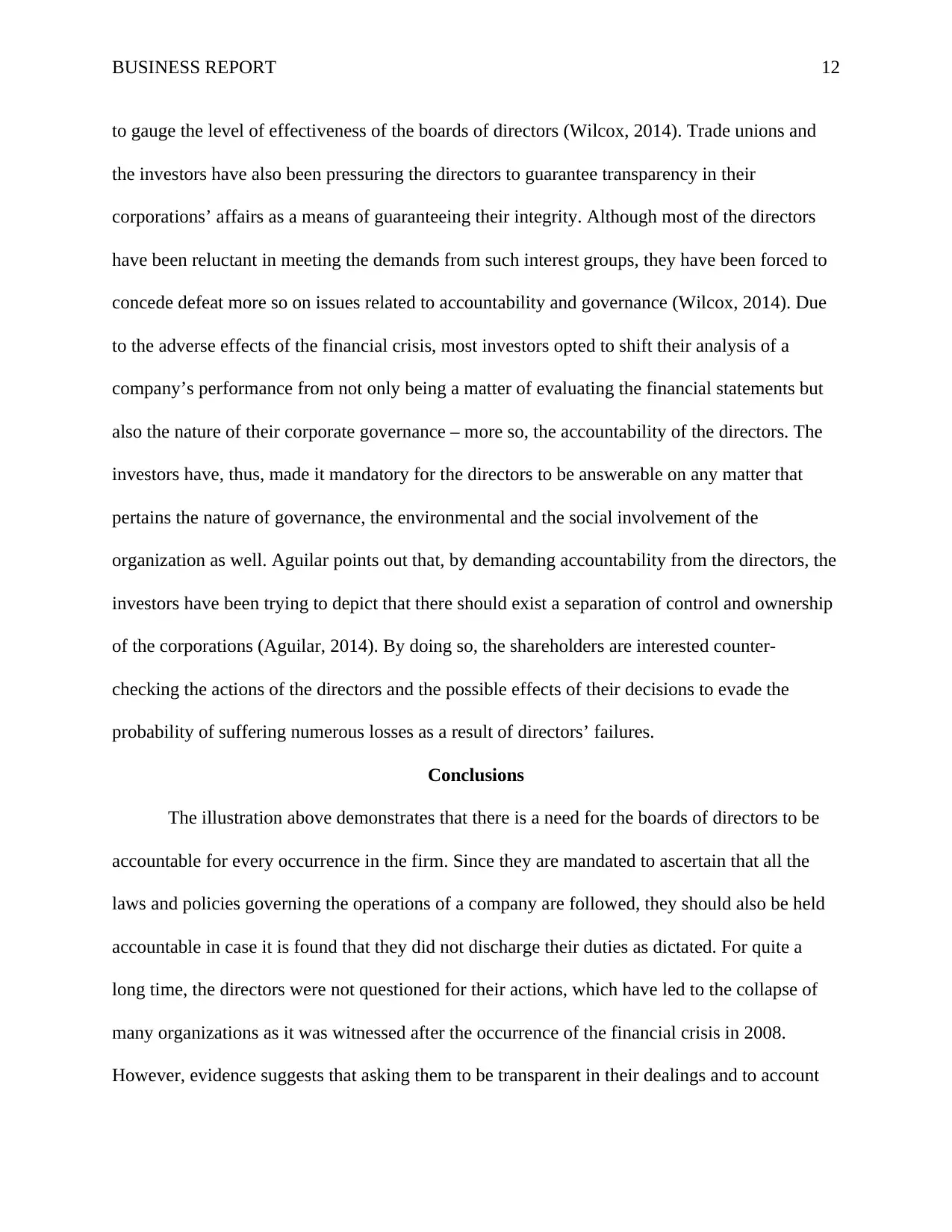
BUSINESS REPORT 12
to gauge the level of effectiveness of the boards of directors (Wilcox, 2014). Trade unions and
the investors have also been pressuring the directors to guarantee transparency in their
corporations’ affairs as a means of guaranteeing their integrity. Although most of the directors
have been reluctant in meeting the demands from such interest groups, they have been forced to
concede defeat more so on issues related to accountability and governance (Wilcox, 2014). Due
to the adverse effects of the financial crisis, most investors opted to shift their analysis of a
company’s performance from not only being a matter of evaluating the financial statements but
also the nature of their corporate governance – more so, the accountability of the directors. The
investors have, thus, made it mandatory for the directors to be answerable on any matter that
pertains the nature of governance, the environmental and the social involvement of the
organization as well. Aguilar points out that, by demanding accountability from the directors, the
investors have been trying to depict that there should exist a separation of control and ownership
of the corporations (Aguilar, 2014). By doing so, the shareholders are interested counter-
checking the actions of the directors and the possible effects of their decisions to evade the
probability of suffering numerous losses as a result of directors’ failures.
Conclusions
The illustration above demonstrates that there is a need for the boards of directors to be
accountable for every occurrence in the firm. Since they are mandated to ascertain that all the
laws and policies governing the operations of a company are followed, they should also be held
accountable in case it is found that they did not discharge their duties as dictated. For quite a
long time, the directors were not questioned for their actions, which have led to the collapse of
many organizations as it was witnessed after the occurrence of the financial crisis in 2008.
However, evidence suggests that asking them to be transparent in their dealings and to account
to gauge the level of effectiveness of the boards of directors (Wilcox, 2014). Trade unions and
the investors have also been pressuring the directors to guarantee transparency in their
corporations’ affairs as a means of guaranteeing their integrity. Although most of the directors
have been reluctant in meeting the demands from such interest groups, they have been forced to
concede defeat more so on issues related to accountability and governance (Wilcox, 2014). Due
to the adverse effects of the financial crisis, most investors opted to shift their analysis of a
company’s performance from not only being a matter of evaluating the financial statements but
also the nature of their corporate governance – more so, the accountability of the directors. The
investors have, thus, made it mandatory for the directors to be answerable on any matter that
pertains the nature of governance, the environmental and the social involvement of the
organization as well. Aguilar points out that, by demanding accountability from the directors, the
investors have been trying to depict that there should exist a separation of control and ownership
of the corporations (Aguilar, 2014). By doing so, the shareholders are interested counter-
checking the actions of the directors and the possible effects of their decisions to evade the
probability of suffering numerous losses as a result of directors’ failures.
Conclusions
The illustration above demonstrates that there is a need for the boards of directors to be
accountable for every occurrence in the firm. Since they are mandated to ascertain that all the
laws and policies governing the operations of a company are followed, they should also be held
accountable in case it is found that they did not discharge their duties as dictated. For quite a
long time, the directors were not questioned for their actions, which have led to the collapse of
many organizations as it was witnessed after the occurrence of the financial crisis in 2008.
However, evidence suggests that asking them to be transparent in their dealings and to account
⊘ This is a preview!⊘
Do you want full access?
Subscribe today to unlock all pages.

Trusted by 1+ million students worldwide
1 out of 17
Related Documents
Your All-in-One AI-Powered Toolkit for Academic Success.
+13062052269
info@desklib.com
Available 24*7 on WhatsApp / Email
![[object Object]](/_next/static/media/star-bottom.7253800d.svg)
Unlock your academic potential
Copyright © 2020–2026 A2Z Services. All Rights Reserved. Developed and managed by ZUCOL.




